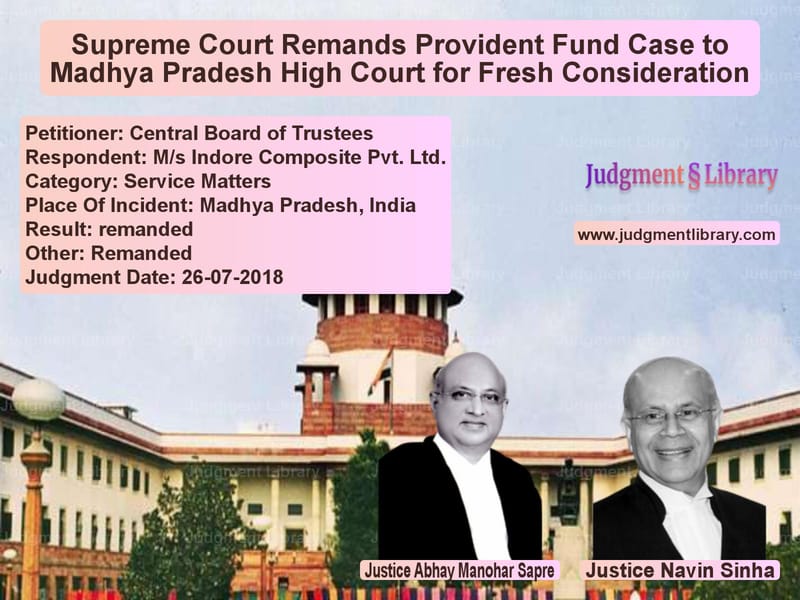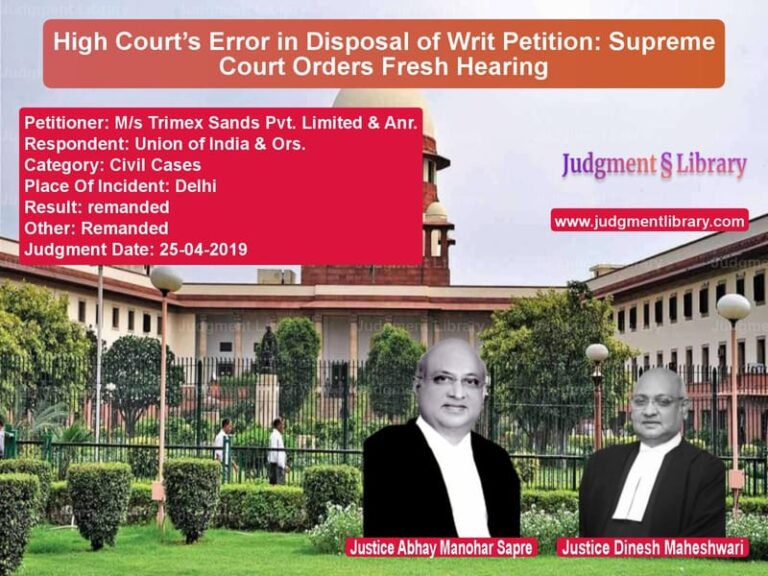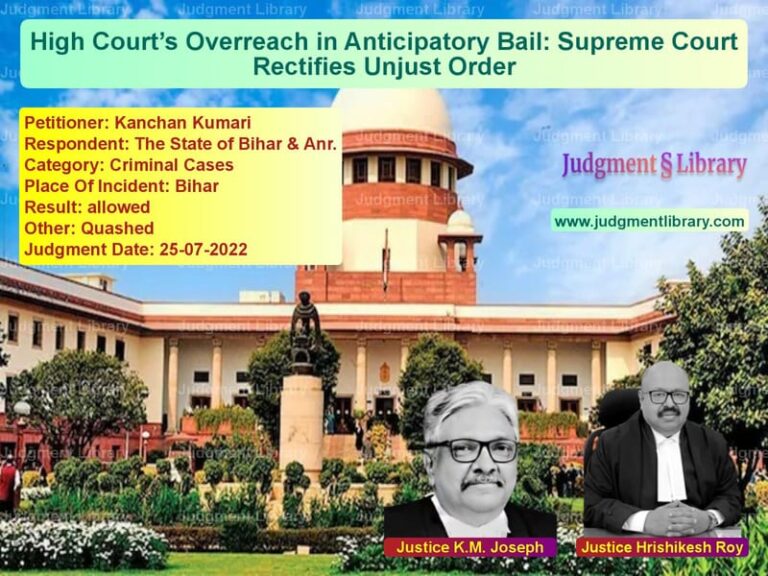Supreme Court Remands Provident Fund Case to Madhya Pradesh High Court for Fresh Consideration
The Supreme Court of India, in Central Board of Trustees vs. M/s Indore Composite Pvt. Ltd., set aside the judgment of the Madhya Pradesh High Court and remanded the case for fresh consideration. The case revolved around the levy of damages and penalties for delayed payments of Employees’ Provident Fund (EPF) contributions, where the High Court had ruled in favor of the employer. The Supreme Court found that the High Court had dismissed the writ petition without adequately considering the legal and factual issues, necessitating a fresh review.
Background of the Case
The dispute originated when the Central Board of Trustees issued a summons to M/s Indore Composite Pvt. Ltd. under Section 7A of the Employees’ Provident Fund and Miscellaneous Provisions Act, 1952. The summons was for non-payment of Provident Fund contributions in the year 2005-2006, where the wages paid were lower than the prescribed minimum wages for semi-skilled workers.
The appellant, after conducting an inquiry, directed the respondent to deposit Rs. 87,204 as unpaid dues. Subsequently, the department imposed additional penalties under Section 14B of the Act, ordering the respondent to pay damages and allied dues amounting to Rs. 91,585 for delayed payments from January 2007 to May 2013.
Petitioner’s Arguments
The appellant, Central Board of Trustees, contended:
- The employer had failed to pay the required Provident Fund contributions on time, causing financial hardship to employees.
- The delay in payment justified the imposition of damages under Section 14B of the EPF Act.
- The Employees’ Provident Fund Appellate Tribunal had erred in setting aside the penalty, and the High Court further compounded the error by upholding the Tribunal’s ruling without addressing key legal questions.
Respondent’s Arguments
The respondent, M/s Indore Composite Pvt. Ltd., countered:
- The calculations made by the Provident Fund department were incorrect, and non-working days of employees had not been considered.
- The employees included in the order were categorized as unskilled workers, but the department had treated all of them as semi-skilled.
- The company had acted in good faith, and the penalty imposed was disproportionate to the alleged delay.
Supreme Court’s Observations
The Supreme Court noted that the High Court had dismissed the writ petition without considering the appellant’s legal arguments. The Court observed:
“In the absence of any application of judicial mind to the factual and legal controversy involved in the appeal and without there being any discussion, appreciation, reasoning, and categorical findings on the issues, it is difficult for this Court to sustain such an order of the Division Bench.”
The Court emphasized that judgments must contain a proper narration of facts, legal issues, submissions of parties, and judicial reasoning. The High Court’s failure to provide adequate reasons for dismissing the writ petition led to the Supreme Court’s decision to remand the case.
Final Judgment and Directives
The Supreme Court issued the following directives:
- The High Court’s judgment was set aside.
- The case was remanded to the Division Bench of the Madhya Pradesh High Court for fresh consideration.
- The High Court was instructed to examine the issues raised in the petition on their merits and provide a reasoned judgment.
- The Supreme Court clarified that it had not expressed any opinion on the merits of the case and that the High Court should decide the matter in accordance with the law.
Implications of the Judgment
The ruling has several key implications:
- Ensures that lower courts provide detailed reasoning and legal analysis in their judgments.
- Clarifies the obligations of employers regarding Provident Fund contributions and the consequences of delayed payments.
- Reaffirms the importance of procedural fairness in labor disputes.
- Strengthens the enforcement mechanisms of the EPF Act by upholding the authority of the Provident Fund department.
Conclusion
The Supreme Court’s decision in Central Board of Trustees vs. M/s Indore Composite Pvt. Ltd. reinforces the importance of reasoned judgments and procedural fairness in labor law cases. By remanding the case, the Court ensured that the issues surrounding Provident Fund contributions and penalties would be reviewed thoroughly by the High Court, providing clarity and consistency in the application of labor laws.
Petitioner Name: Central Board of Trustees.Respondent Name: M/s Indore Composite Pvt. Ltd..Judgment By: Justice Abhay Manohar Sapre, Justice Navin Sinha.Place Of Incident: Madhya Pradesh, India.Judgment Date: 26-07-2018.
Don’t miss out on the full details! Download the complete judgment in PDF format below and gain valuable insights instantly!
Download Judgment: Central Board of Tru vs Ms Indore Composite Supreme Court of India Judgment Dated 26-07-2018.pdf
Direct Downlaod Judgment: Direct downlaod this Judgment
See all petitions in Employment Disputes
See all petitions in Public Sector Employees
See all petitions in Disciplinary Proceedings
See all petitions in Judgment by Abhay Manohar Sapre
See all petitions in Judgment by Navin Sinha
See all petitions in Remanded
See all petitions in Remanded
See all petitions in supreme court of India judgments July 2018
See all petitions in 2018 judgments
See all posts in Service Matters Category
See all allowed petitions in Service Matters Category
See all Dismissed petitions in Service Matters Category
See all partially allowed petitions in Service Matters Category







